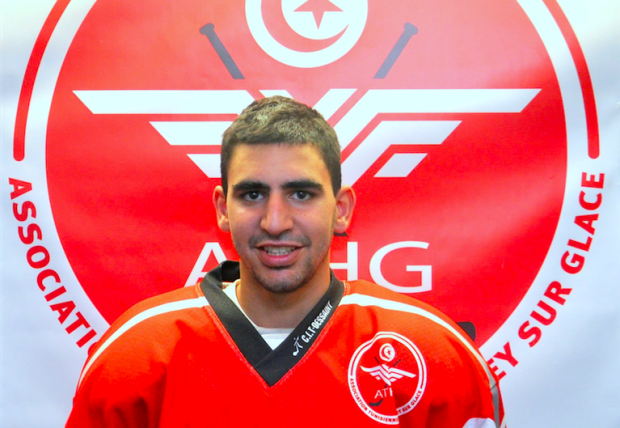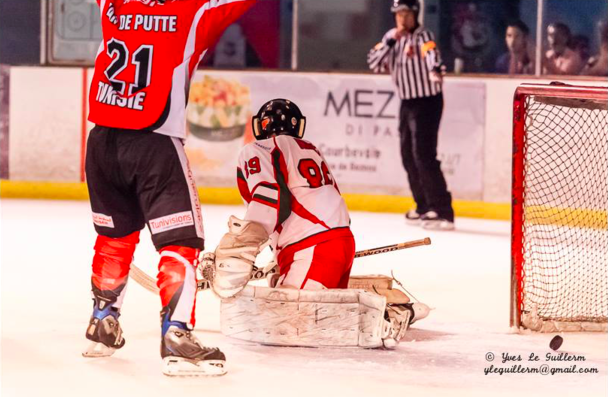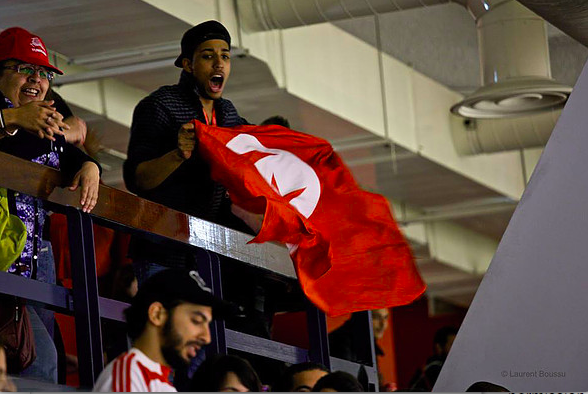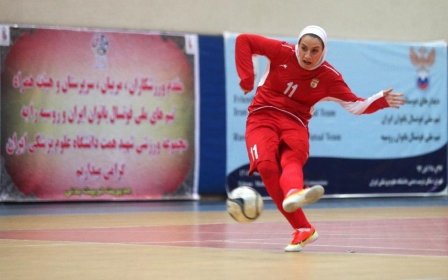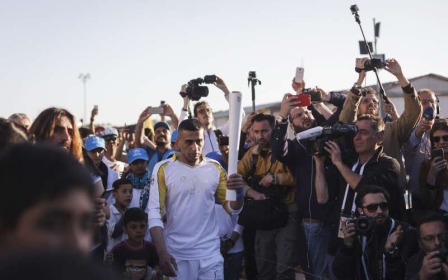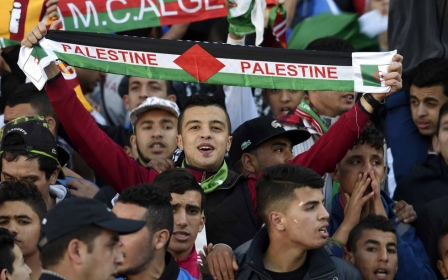Cool Runnings: Tunisia’s first ever ice hockey team hopes to make history
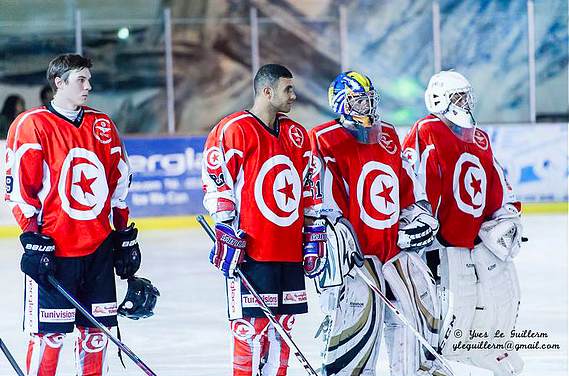
TUNIS - Noise filled the room, but for Amine Van de Putte, who sat alone by the bar, life seemed emptier than usual. He took a sip from his glass; Thursday had slipped into Friday, and it was one in the morning on a cold Belgian night.
Van de Putte had dedicated his life to sport but was forced onto the bench when he tore a knee ligament playing for the Leuven Chiefs, the top amateur ice hockey club in Belgium. Six months on, recovery was going slowly and there was doubt regarding his future.
Out of the blue, however, a man walked up to him and started a conversation, “Where are you from? You look darker than the rest of the Belgians here.”
Van de Putte, with his olive complexion and curly hair, told him, “Well, my dad is Tunisian, but I never knew him. He was a famous footballer.”
The man was intrigued, “Oh yeah? What’s his name.” Van de Putte responded, “Riyad Fahem. Same hair as mine.” The guy’s face lit up. “Riyad was the brother of my brother’s best friend!”
Van de Putte says it seemed like fate had brought the men together, but his new acquaintance came bearing bad news - Van de Putte’s father had died just a few days earlier. Just as the then 22-year-old thought he might get a chance to meet his father at last, he learnt that it was too late.
The next morning, Van de Putte had an unusually large number of friend requests on Facebook, all from Tunisians. Word had spread that Riyad Fahem, the famous goal scorer of the Tunisian national team, had an unknown son who had now been identified.
Getting in touch with his roots
That was in February 2014. Three weeks later, Van de Putte drove to Paris to meet with his Tunisian cousins for the first time. A month later, out of the blue, he received a message on Facebook from Ihab Ayed, the founder and president of Tunisia’s Hockey Association, who asked Van de Putte if he wanted to play for Tunisia’s national team.
Van de Putte did not hesitate and said yes immediately. Ayed cautioned him that if he played for Tunisia, he would not be able to play for Belgium’s national team in the future. Still, Van de Putte was sure. He wanted to wear the colours of the flag of his father’s country and wear the name "Fahem" on the back of his jersey.
The decision was not taken lightly. With his injury now behind him, Van de Putte was back on form and ready to resume his promising career, which many of his coaches felt would lead him to play for Belgium’s senior national team. Despite this, he said that too many coincidences had happened to him to ignore the new direction.
"The way everything worked out with getting to know my family made the decision easy," he told Middle East Eye.
Amine’s fateful journey
Van de Putte was born in Belgium to a Belgian mother. When Van de Putte was one, his father Riyad’s visa expired and he was forced to return to Tunisia. His mother was unable to take care of the boy, so she found a family willing to adopt him.
Van de Putte’s new family had extended relatives who played ice hockey and one of them, a Czech ice hockey player, passed down his love of the sport.
At the age of two, Van de Putte started skating. At six, he was playing. Then at 12, he joined Belgium’s national team. He would go on to represent Belgium U18 and U20 teams at the ice hockey World Championships and started winning individual awards.
For all his success, however, he often felt like something was missing.
When he was young, he would see his biological mother five times a year, but she died when he was 13. After her death, he tried to find his father and scoured the internet for three years, sending message after message to prospective leads, yet he got nowhere.
He told MEE he felt it was fate that as he was nursing his injury and sinking into depression, he was finally given a chance to connect with his biological family and eventually represent the Tunisian national team.
Building Tunisia’s ice hockey team
Ayed started putting together the squad in 2007 and it would be seven years before the team played in its first match.
Ayed, whose family hails from the coastal town of La Chebba in Mahdia province, grew up in Courbevoie, France, but was determined to bring ice hockey, traditionally a preserve of colder countries, to the Mediterranean nation.
Tunisia’s ice hockey team played its first match in Ayed’s hometown of Courbevoie against a local professional team – they narrowly lost after leading 4-1. For years he scoured the globe looking for players and went as far afield as Canada and Finland to assemble a 30-man team from amidst the Tunisian diaspora.
Not a single member was born in Tunisia, but they were all proud to play for their father or motherland. Ayed said that 99 percent of the players he reached out to wanted to sign up.
Despite its international flavour, the team quickly started to bond around their shared heritage.
“My mom cooked us tons of cous cous,” Ayed told MEE, while explaining that the dish is always cooked and much loved by all Tunisians – no matter where in the world they are.
“My mom also made salata meshwiya [grilled pepper salad], and she was worried that it would be too spicy for these guys,” Ayed said. But his players lapped it up.
He says that people thought it was a joke initially, but then once all the players arrived, they started taking the team more seriously – much like the Jamaican bobsled team that first gained fame during their debut in the 1988 Olympic Debut and later inspired the 1990s movie Cool Runnings.
African Ice Hockey Cup
The team now faces its biggest challenge yet. Later this month it will compete in the first pan-African Ice Hockey Cup where teams from Algeria, Egypt, Tunisia and Morocco will battle for victory in Casablanca and Rabat from 24 to 30 July.
“I expect this will show the people of Tunisia that we are the real deal,” Ayed said.
Currently, there are zero ice hockey rinks in Tunisia with just one small ice skating rink in Tunis and another in Hammamet, some 50 kilometres to the south. Right now, the whole hockey project is self-funded and the players have had to scrimp and save to keep the project afloat.
Ayed says that the tournament could change this. He hopes that it will allow him to register the team in Tunisia (it is currently registered in France) and secure funding from the Tunisian Sports Ministry. If he gets the cash, he plans to start a children’s clinic at the small rink in Tunis, and build up a new generation of native talent, with parents reportedly already reaching out to sign their kids up.
Sarhan Nasri, a spokesman for the Sports Ministry, told MEE that they were keen to “develop the sport and hoped to see the team one day compete in the Winter Olympics,” but that they first needed to be registered in Tunisia.
With government finances under heavy strain, getting funding may yet prove extremely challenging, but Ayed says that he is determined to keep on pushing.
“Tunisia has never sent an athlete to the Winter Olympics, which is embarrassing,” Ayed said.
But win or lose, Van de Putte says the tournament is set to be a defining moment in his life and that he cannot wait to captain Tunisia’s fledging team and follow in his father’s footsteps by representing his country.
“Knowing somebody’s like you, but you’ve never met him. That’s cool,” he said. "It feels great to play for Tunisia's national team. It shows my family that I respect them.”
New MEE newsletter: Jerusalem Dispatch
Sign up to get the latest insights and analysis on Israel-Palestine, alongside Turkey Unpacked and other MEE newsletters
Middle East Eye delivers independent and unrivalled coverage and analysis of the Middle East, North Africa and beyond. To learn more about republishing this content and the associated fees, please fill out this form. More about MEE can be found here.


